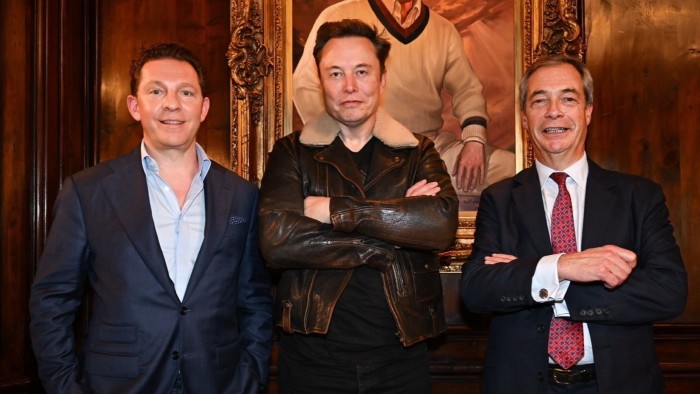Unlock the Editor’s Digest for free
Roula Khalaf, Editor of the FT, selects her favourite stories in this weekly newsletter.
America did not elect Elon Musk. Yet he is acting as Donald Trump’s de facto co-president. Musk’s self-appointed remit includes gunning for regime change in allied democracies. He has repeatedly said only the far-right Alternative for Germany (AfD) can save Germany in next month’s election. He is calling for an end to Sir Keir Starmer’s Labour government in the UK. And he has asked his 211mn X followers if “America should liberate the people of Britain from their tyrannical government”. The consensus seems to be yes.
It would be an understatement to say there is no precedent for such a relationship between America’s president and the world’s richest man. History offers no guidance on this kind of duet, let alone the money half of it openly gunning for the overthrow of allied governments. America’s robber barons — the Rockefellers, Vanderbilts and Carnegies — did not act as co-equals with the presidents of their day. Nor did their fabled wealth compare to Musk’s. JP Morgan was worth $49bn in today’s dollars. Henry Ford, who also had a soft spot for European fascism, was closer to $200bn. Musk’s wealth is more than double that. Ford was not admired by Franklin Roosevelt, his White House contemporary.
By contrast, the past is strewn with instances of America interfering in other countries’ politics. With the exception, however, of the CIA’s postwar bag of tricks to keep communists from power in continental Europe, Washington’s meddling has excluded allies. The question facing governments in Berlin, London and probably Paris soon is how to respond to this novel threat. Is Musk speaking for Trump? In which case, the west is as good as dead. Or is he testing the waters? That would give western capitals scope to exploit differences between Trump and Musk. The answer is probably a mix of the two.
Just as significant is what Musk is not saying. As he bombards Germany and the UK with abuse, Musk’s silence on Russia and China speaks even louder. Musk has never spoken out for political prisoners or against repression in either of those autocracies. Yet he lionises Tommy Robinson, a far-right British thug serving his fifth jail sentence, as a prisoner of conscience. It is safe to say that Musk is not motivated by philanthropy towards English child victims of gangs of men of mostly British-Pakistani origin. The UK’s child grooming scandals date back more than two decades during almost all of which a Conservative government was in office. Musk had nothing to say then.
Since Labour came to power, the welfare of England’s children has suddenly become his obsession. He labelled Jess Phillips, a minister in Starmer’s government, “a rape genocide apologist”. He also claims that a quarter of a million British children are being systematically abused. You would need an AI-scale polygraph to capture all of Musk’s disinformation. At a rate of one every few minutes, the velocity of his posts is outdone only by their shock value. Nowhere has Musk expressed concern for the estimated 20,000 Ukrainian children abducted from their homes and forcibly adopted into Russian families.
If this agitation were Musk’s alone, Britain, Germany and others could handle it. The British public’s dislike of Musk puts a limit on his influence. Fewer than one in five British respondents view him favourably, according to a recent YouGov poll. Musk is also upended by his ignorance. By calling for Nigel Farage to be removed as leader of the rightwing Reform UK party, he missed the fact that Reform is Farage’s personal vehicle. Musk’s call on King Charles to dissolve parliament reinforces questions about his ignorance. Elected governments, not monarchs, choose when to call a UK general election. Musk’s impact on Germany — and knowledge of it — may be even lower.
Musk’s silence on China is easier to understand. His Tesla company has big operations there that he does not want to risk. Trump’s default approach to the world is transactional; his China policy remains up for grabs. By contrast, Musk amplifies Trump’s admiration of Vladimir Putin’s Russia and disdain for Europe. It would be rash to assume Musk is just trolling. Nor is this just about money. The Trump-Musk antipathy towards European liberal democracy is real. He shares Trump’s impatience to end the Ukraine war on terms that might end up favourable to Russia. The AfD vows to end Germany’s support for Ukraine. Starmer has stepped up British aid.
The eastern side of the Atlantic alliance thus faces a journey without maps. Europe’s habit has always been to hope for the best. On this occasion it should plan for the worst.
edward.luce@ft.com
Read the full article here




